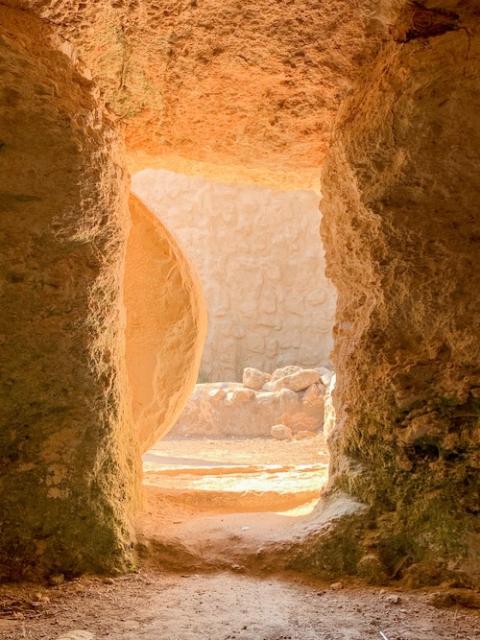
(Unsplash/Pisit Heng)
The tomb was, indeed, found empty. And the reason for this was that the man who was buried there had risen from the dead. The empty tomb: the absence of a body buried in this tomb, threw the women into flight, astonishment, silence and fear. What does this mean? Has someone stolen the body of our beloved one? With these reactions, the women initially receive the angel's message about God's action in raising Jesus from the dead (Luke 24: 1-8). These are proper reactions to the climax of divine revelation that has occurred in the resurrection. God's action has transformed the whole situation. The risen son of God becomes our only hope of salvation, where death leads to new life. The empty tomb, the absence becomes the sign of Presence!
The coronavirus (that causes COVID-19) has led to the emptying of public spaces around the world, whether by government decree or by more personal responses. Governments across the world have put measures in place restricting people's movements, among other restrictions. It's a struggle. It really is. We no longer go to our churches for communal Eucharistic celebration, we no longer gather in large groups, we are unable to meet members of our families, and we no longer shake hands. Worse still, in some instances, we no longer can bury our loved ones in a family grave!
We are gradually moving farther away from each other, enlarging the "empty tomb" in size and depth. Absence is slowly defining human life in a world wrapped in universal grief. How possible is it to imagine any glimpse of hope in the absence we continue to experience?
Perhaps the wide and varied challenge from the COVID-19 pandemic invites us to walk still more closely with Christ. This is the risen Christ who remains in and with us even as we face the many challenges in this moment. The tomb may be empty, but we must look beyond the absence in order to experience the Presence. "Why do you seek the living among the dead? He is not here" (Luke 24:5).
Advertisement
I don't know what you are dealing with right now. I don't know if you are scared, overwhelmed or if you feel secure. But right now, I am thinking about hope. And asking: How do we find hope in the empty tomb? How will the absence ever become Presence in the reality of our daily struggles and challenges? Jesus is risen and walks with us in every aspect of life. He is present even in the most unusual situations. He is the reason for our hope, and "the empty tomb is our reason for existence" (see NCR's Copy Desk Daily from April 6).
The global uncertainty occasioned by COVID-19 is turning our world upside down. In the face of this crisis, reason and peace can be engulfed by fear and hopelessness. We can easily begin to question whether God is still present, and, if so, what is God doing about this crisis? At a crisis time like this, it is easy to lose hope and get fixated on the empty tomb, the absence. The invitation for now is to look beyond the darkness and embrace whatever glimpses of hope we may have.
It has become evident that the church is becoming physically absent among her people. We no longer gather for communal eucharistic celebration, and there seem to be no public Masses throughout the Catholic world! This has become our reality now, a measure taken believing that one of the most effective ways of stopping the spread of COVID-19 is by social distancing. So, we socially distance ourselves from each other and from our churches. But two questions beg answers:
How are we being Church as COVID-19 sweeps our world?
How are we inspiring hope in those around us?
We find hope in the words of Franciscan Friar Daniel Horan, who argues that we cannot:
…minimize God and restrict God's presence to a limited number of discrete locations. It's true that Christ is uniquely present in the Blessed Sacrament, but it's not true that this is the only way God draws near to humanity and the rest of creation. God's grace is not scarce nor is God distant from us!
The church's absence (empty tomb), her literal emptying, can function as a symbol of her trust in God's ability to meet us regardless of the location. The church remains the church whether gathered or scattered and continues to be a beacon of hope to a world on the verge of despair. "Do not be afraid," said Jesus, "Go tell my brothers [and sisters] to go to Galilee. There they will meet me" (Matthew 28:10). Do we stand, paralyzed, in front of the empty tomb, or do we go in search of the risen one, who is already gone before us?
In his final discourse before his death, Jesus tells his disciples that it is better that he goes away so that the comforter (the Holy Spirit) would come. The point is that the loss of his physical presence through his death, resurrection and ascension would lead to an even deeper communion with God. It is possible that, strangely enough, the absence of the church will be great testimony to the presence of God in our care for one another. It is a paradoxical time calling us to be a source of hope for one another.
May the empty tomb, the absence we feel, be the Presence that gives meaning to our hope.
Be blessed and keep safe.
[Scholasticah Nganda is Kenyan by birth and a member of the Congregation of the Sisters of Mercy. In early ministry, she taught and held leadership positions at the secondary and university levels. Her graduate work was in counseling and counseling psychology. After serving on the leadership team of her congregation, she is now serving as the director of pastoral programs for Solidarity with South Sudan, Juba, and is one of four members of the Solidarity Pastoral Team working in collaboration with the Catholic Bishops Conference of South Sudan to meet the pastoral needs of the church there.]







